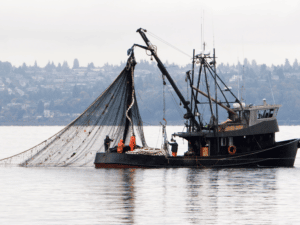Commercial fishing is one of the oldest and most dangerous professions in the world. Since ancient times, seamen have gone to sea or sailed on dangerous waterways to harvest the bounty of rivers, lakes, oceans and other navigable waters to feed millions of people. Jobs on fishing vessels and the ports that they sail from are lucrative but full of hazards. According to the Centers for Disease Control and Prevention (CDC), between 2000 and 2010, the death rate among commercial fishing workers was 124 per 100,000 persons, approximately 46 per year. Included in this death toll are harvesters of groundfish and dockworkers called lumpers.

A Dangerous Calling: Ground Fishermen
Ground fishing or bottom fishing involves catching fish that live in the bottoms of rivers, lakes, and the open waters of the sea. In the United Kingdom, this type of commercial fishing is known as legering. Ground fishing can be done from the shore and small boats with specially fitted fishing rods, but large scale bottom fishing is done by trawlers equipped with weighted nets called trawls. These trawls are dragged along the bottom of the body of water to grab groundfish such as cod, flounder, halibut, rockfish, and sole.
As in all types of commercial fishing, ground fishing is inherently dangerous. According to the CDC, this type of work takes place in a harsh environment, involves hard physical labor, requires long workdays, and is often hampered by rough water conditions and bad weather. In addition, fishing vessels, including trawlers and dredgers, are loaded with assorted gear and equipment that can often be as dangerous as it is useful. Trawlers are festooned with nets, cranes, winches, and pulleys that haul tons of fish out of the water. In addition, these fish are dumped on decks and must be manually sorted. In such a work environment, seamen are at risk of being snagged by winches, getting entangled by nets, or having slip, trip, or fall accidents on deck or even falling overboard into icy, rough waters.
Another safety-related issue is that ground fishermen in the Atlantic region, especially in Maine, work on boats which are smaller than 79 feet in overall length. These vessels are exempt from mandatory safety inspections which apply to larger fishing boats. According to the Portland (Maine) Press-Herald, a Coast Guard commercial fishing boat examiner said that boats built before 1991 and with overall lengths less than 79 feet don’t have to be inspected for sea stability issues. The examiner pointed out that most fishing vessels that sink are smaller than 79 feet.
Common Types of Accidents in Groundfishing
According to statistics released by the CDC’s National Institute for Occupational Safety and Health (NIOSH), the Atlantic groundfishing region is home to the deadliest fisheries. Per NIOSH, the Northeast multispecies groundfish fishery is statistically the leader in fatalities, with 600 deaths per 100,000 Full Time Equivalents (FTEs) reported between 2000 and 2009. In contrast, the Atlantic scallop fishery averaged 425 fatalities per 100,000 FTEs in the same time period.
Per NIOSH, the most common types of commercial fishing deaths are caused by:
- Vessel disasters
- Falls overboard
- Onboard injuries
Seamen working aboard any type of ground fishing vessel are at risk of being injured in accidents, including:
- Falls through open hatches
- Accidents involving impacts by heavy objects
- Slips, trips, and falls on slippery decks
- Ladder and gangway accidents
- Getting snagged on fishing lines or netting
- Crane and winch accidents
- Falls overboard, especially in situations where safety railing is defective or nonexistent
These accidents cause a wide array of serious and life-threatening injuries, including amputations, crushed limbs, repetitive stress injuries to the back, neck, and shoulders, mechanical asphyxiation, deep cuts, abrasions, post-traumatic stress disorder (PTSD) and drownings.
Lumpers and Related Accidents
Lumpers are day laborers who are employed to unload cargo from vessels, including fish. Lumpers usually handle large cargo containers of lumber or other dry goods, but in fishing ports they are often hired to carry a fishing boat’s catch from the holds of the vessel to shore. As with all longshore jobs, lumpers run the risks of being caught between a ship and a dock, falling off a gangway while carrying a heavy load of fish, being snagged by an unsecured fishing line, or struck by moving objects aboard a vessel or on the docks.
Compensation for Maritime Workers in the Groundfishing Industry
On the job accidents can have serious consequences for commercial fishermen and longshore employees. They often cause disabling injuries that limit a maritime worker’s ability to stay on the job and in many cases end a career permanently. This results in huge medical costs, pain and suffering, and a reduced capacity to earn a living. If you’ve been injured, you may be entitled to damages to pay for these costs. For more information on rights and compensation, refer to our article Maritime Rights and Compensation.
Sources:
- http://www.cdc.gov/niosh/topics/fishing/
- http://web.archive.org/web/20070930180809/http://ecfr.gpoaccess.gov/cgi/t/text/text-idx?type=simple;c=ecfr;cc=ecfr;sid=8f61276f3c17bc9d1ceb08e0ec8da919;region=DIV1;q1=groundfish;rgn=div7;view=text;idno=20060406;node=20060406:1.0.11
- http://www.pcouncil.org/groundfish/background/
- http://www.pressherald.com/news/the-killer-catch-groundfishing-in-atlantic-the-deadliest-by-far_2010-09-17.html